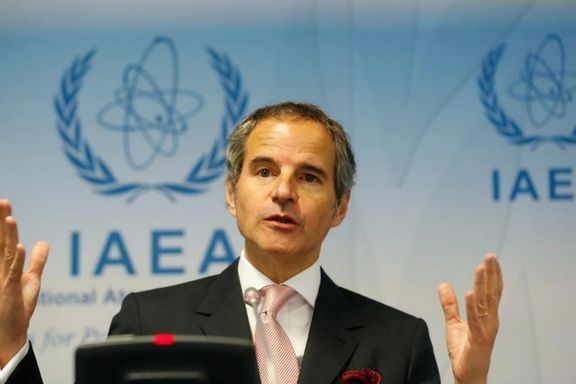Iran Says UN Nuclear Chief Grossi To Visit Monday As Deadlines Loom

Rafael Grossi, head of the International Atomic Energy Agency (IAEA) will visit Iran Monday, state media said Wednesday, before the IAEA board meets November 24.

Rafael Grossi, head of the International Atomic Energy Agency (IAEA) will visit Iran Monday, state media said Wednesday, before the IAEA board meets November 24.
The reports cited Behrouz Kamalvandi, spokesman for the Atomic Energy Organization of Iran (AEOI). The visit would also come ahead of the planned resumption of talks in Vienna November 29 between Iran and world powers aimed at reviving Tehran’s 2015 nuclear agreement, the JCPOA (Joint Comprehensive Plan of Action) and as an IAEA report says Iran’s stock of uranium enriched to 60 percent has jumped nearly 80 percent in under three months.
Kamalvandi said Grossi would meet with Iran's Foreign Minister Hossein Amir-Abdollahian and AEOI chief Mohammad Eslami.
IAEA access to Iran’s nuclear program would be crucial in monitoring a revived JCPOA, but Grossi, along with Western states, has expressed growing concern since February 2020 when Iran reduced access to little more than required under the Nuclear Non-Proliferation Treaty (NPT).
IAEA full access
Grossi has also criticized as inadequate explanations given by Iran over traces of uranium found at two undeclared sites and relating to work carried out before 2003.
A more pressing issue for Grossi is restoring access to Iran’s Karaj plant under terms of a temporary arrangement first made in February. While IAEA inspectors have been allowed to service monitoring equipment elsewhere, Iran has barred this at Karaj on the grounds it is carrying out a security investigation after a June attack, widely attributed to Israel.
An IAEA report this week puts Iran’s stockpile of uranium enriched to 60 percent at 17.7kg, up from 10kg in September. While this is less than the 25kg claimed by nuclear spokesman Behruz Kamalvandi November 4, it represents a large increase in a level of enrichment close to the 90 percent regarded as ‘weapons grade.’
Tehran has also now 113.8kg enriched to 20 percent, up from 84kg in September. A purity of only 3.67 percent is allowed under the JCPOA.
It also emerged Wednesday, in an agency report, that Grossi wrote to Iran October 25 complaining over excessively invasive physical searches by security officials at nuclear sites.
If Grossi fails to make progress next week, the European JCPOA signatories – France, Germany, and the United Kingdom – may discuss with the United States options to raise Iran’s lack of cooperation at the IAEA board. Speculation they might do so at a board meeting in September waned once Grossi extended the temporary monitoring agreement, which the IAEA chief later insisted covered Karaj as well as other sites.
Reuters quoted a senior diplomat Wednesday that the IAEA, given its lack of access, did not know if Iran has resumed manufacturing advanced centrifuges – the devices used to enrich uranium – at Karaj, as was reported Tuesday by the Wall Street Journal citing “diplomats familiar with the activities.” The advanced centrifuges enable quicker and more efficient enrichment of uranium, thereby reducing the time it would take to enrich to 90 percent ‘weapons grade.’
Karaj parts installed at Ferdow
“According to one of the diplomats familiar with Iran’s program, Iran has installed the centrifuges whose key parts were produced at Karaj at Iran’s underground, heavily fortified, Fordow site,” the Journal reported. The diplomat quoted said there was no evidence the equipment had been diverted elsewhere but “as the number of unmonitored centrifuges increases, the likelihood for this scenario increases.”
The Vienna talks have been in abeyance since June when Iran stopped its participation. While the US has continued ‘maximum pressure’ sanctions introduced by previous president Donald Trump on leaving the JCPOA in 2018, Iran has continued to expand its nuclear program – notably in enriching uranium to 60 percent, far above the 3.67 percent allowed under the JCPOA, and in using advanced centrifuges banned under the deal.
The new government in Tehran, which includes critics of the JCPOA, has adopted a more assertive tone, suggesting that while Iran would like to see US sanctions lifted, a return to the nuclear deal is a lower priority that it was under the previous administration of President Hassan Rouhani.